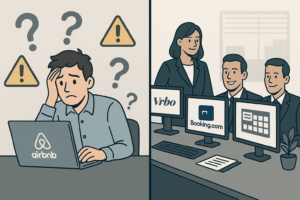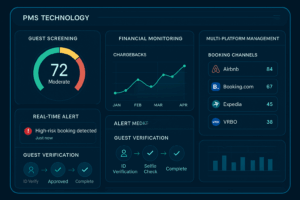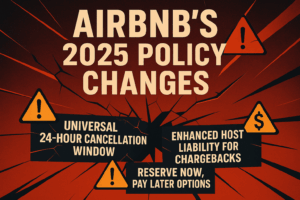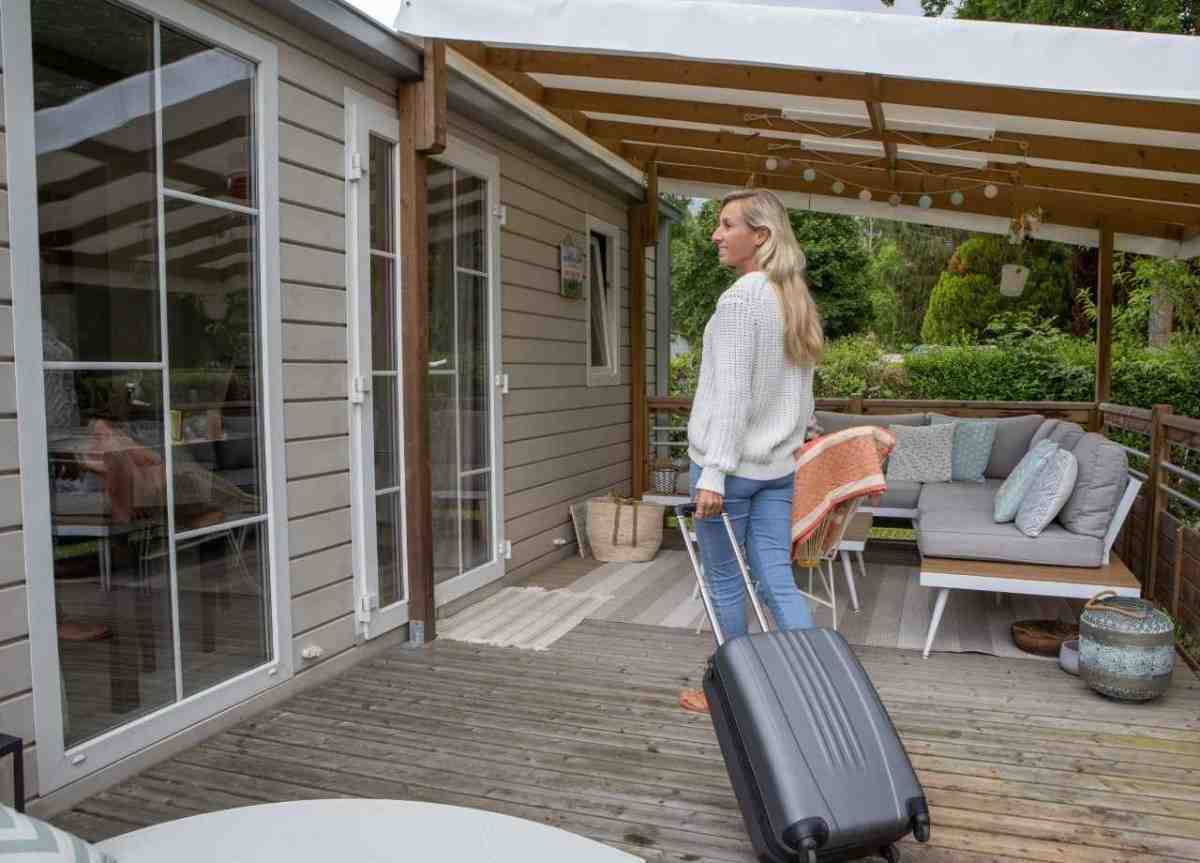The vacation rental industry is experiencing its most significant policy shift in years. Here’s what PMS platforms, Guest Apps and other Hotel Tech vendors need to understand about the new demands their clients are now facing.
A Disruptive Shift: What’s Really Happening
October 1, 2025 marks a turning point in the short-term rental industry. Airbnb has rolled out sweeping policy changes that fundamentally alter the risk-reward equation for property managers and hosts worldwide. These aren’t minor tweaks, they’re game-changing modifications that transfer substantial financial risk from the platform directly to property owners. This isn’t just a policy update; it’s a complete rebalancing of power in favor of guests while operators are scrambling to adapt.
The changes come at a time when property managers are already dealing with increased competition, rising operational costs, and regulatory pressures. Now, they were informed they’ll need to navigate an environment where their financial security faces new vulnerabilities (from multiple angles!) and they’ll be looking to their tech stack for solutions.
The three big changes impacting STR operators
- Universal 24-Hour Cancellation Window – No exceptions, no escape
- Enhanced Host Liability for Chargebacks – Client revenue isn’t safe even after checkout
- “Reserve Now, Pay Later” Options – Booking without commitment
The 24-Hour Cancellation Revolution: What Your Clients Face
Starting October 1, 2025, every Airbnb booking under 28 nights comes with a mandatory 24-hour cancellation grace period that applies universally across all cancellation policies, even the previously ironclad “Strict” policy. This change eliminates the most protective booking option your clients previously relied on and creates new vulnerabilities for high-value seasonal bookings.
Key Elements
- 24-hour refund window – Full refund within 24 hours of booking confirmation
- Elimination of Strict policy for new listings (grandfathered existing only)
- Restructured policy options – Limited protection with Firm policy as the new maximum
- Seasonal booking vulnerability – Holiday and peak season bookings at highest risk
- No opt-out options – Mandatory implementation across all standard policies
The financial impact is significant: a $1,500 holiday weekend booking that previously guaranteed 50% retention under Strict policy now offers zero protection if canceled within the policy window. This will drive immediate demand for enhanced booking management systems with cancellation tracking, policy synchronization across platforms, and revenue forecasting capabilities that account for increased cancellation risk.
The Chargeback Nightmare: The PMC’s New Financial Reality

Effective September 8, 2025, Airbnb’s updated payment terms introduced unlimited host liability for guest chargebacks, creating a scenario where completed stays can result in financial losses weeks or months later. This policy change represents the most dangerous shift for hospitality operators’ financial security, as it removes time limits on payment disputes and places full liability on property owners.
Key Elements
- No time limits – Chargebacks can occur months after completed stays
- Automatic deductions – Airbnb withdraws disputed amounts from future payouts immediately
- Limited recourse – Minimal dispute resolution options with no guarantee of protection
- “Reserve Now, Pay Later” complications – Increased cancellation risk when payment comes due
- Fraudulent dispute potential – Guests can enjoy their stay and then dispute the charges, we call it Friendly Fraud and it’s more common than you think.
Property managers will need comprehensive financial tracking systems that can monitor chargeback exposure, maintain detailed transaction records for dispute resolution, and provide early warning systems for high-risk bookings alongside proactive guest screening and fraud prevention capabilities.
The Strategic Reality: This is Airbnb’s Industry Alignment That Operators Must Navigate
Airbnb’s 2025 policy changes aren’t revolutionary – they’re strategic alignment with industry standards that other major OTAs have maintained for years. VRBO implemented similar chargeback policies years ago, Booking.com has long operated with guest-favorable cancellation terms, and traditional hotel booking platforms have always prioritized guest flexibility over property owner protection. Airbnb is simply catching up to industry norms where platforms compete primarily on guest convenience rather than host protection. This represents a calculated move from a startup mentality focused on host empowerment to a mature platform strategy centered around guest acquisition and retention.

The Implications for PMS Platforms and Guest Apps
Users who previously viewed Airbnb as the “safer” platform option now realize that all major OTAs carry similar risks. What we know for sure is that operators will expect these enhanced safeguards and functionality to magically appear and seamlessly integrate into their existing workflows. The PMS platforms that are thinking ahead and proactively developing comprehensive guest screening, chargeback protection, and risk management tools will be best positioned to meet these immediate demands, instead of scrambling to catch up in an increasingly competitive landscape.
Not All Hospitality Operators Are Affected The Same
For years, many PMCs operated under a perceived safety net – the belief that as long as Airbnb handled payments and disputes, they could focus solely on property management without worrying about guest vetting or financial risk. This “safety bubble” has now definitively burst, but the impact varies dramatically depending on the operator’s business model and platform diversification. If the old user mindset was “I don’t need to worry about who books my property as long as Airbnb processes the payment and handles any issues”, the new reality is a quite different.
- For Smaller, Airbnb-Only Operators: The policy changes represent a double challenge for smaller PMS users. These operators must now simultaneously learn guest screening procedures they’ve never needed before while also diversifying their booking channels to reduce platform dependence. This creates a steep learning curve where they’re implementing new operational processes across multiple platforms simultaneously, often without the resources or experience to do so effectively.
- For Professional Operators with Diversified Portfolios: Ironically, these changes may actually benefit the larger players who already maintain presence across multiple platforms. Professional property managers have long implemented comprehensive guest screening and risk management procedures for VRBO, Booking.com, and direct bookings – platforms that never offered the same perceived protection as Airbnb. Now that the playing field has leveled, these players simply need to extend their existing safety protocols to include their Airbnb inventory.
The Professional Operator’s Advantage
Where smaller clients see disruption, professional operators see standardization. Enterprise brands already have (or should already have!):
- Established guest screening procedures across platforms
- Financial reserves and insurance coverage for chargeback protection
- Documentation systems and dispute resolution processes
Sometimes these capabilities are integrated directly into their PMS platform, while other operators rely on point solutions within their broader tech stack. However, as the industry faces these new challenges, the demand for comprehensive all-in-one solutions will grow drastically, especially for users with varying levels of technical expertise who need seamless, unified functionality rather than managing multiple disparate tools.
The shift from platform protection to host responsibility represents the most significant change in the vacation rental industry since Airbnb’s inception. Even professional operators aren’t entirely in the clear, as many need to adjust and standardize their existing processes to now include Airbnb properties that may have been previously exempt from their rigorous screening protocols. This operational shift across their entire portfolio represents a significant undertaking that requires systematic implementation and technology support to execute effectively across all booking channels.
What PMS Users Will Demand: Immediate Technology Needs

This transformation creates a massive opportunity for PMS providers and tech vendors to become the new “safety net” that Airbnb no longer provides. Users will be looking for technology solutions that can provide consistent risk management, guest screening, and financial protection across all booking channels.
1. Enhanced Guest Screening Capabilities
All shapes and sizes of operators will need sophisticated guest evaluation tools that can assess risk across all booking platforms. This isn’t about platform discrimination, it’s about providing your clients with the business intelligence they need to make informed booking decisions.
Critical Features:
- Automated guest communication analysis and risk scoring
- Cross-platform booking pattern evaluation
- Incident history aggregation and analysis
- Red flag identification and alert systems
- Customizable screening criteria for different property and guest types
2. Financial Protection and Monitoring
Vacation rental professionals now need comprehensive financial management tools that can track chargeback exposure, maintain detailed transaction records, and provide early warning systems for high-risk bookings.
Essential Capabilities:
- Real-time chargeback monitoring and alerts
- Automated reserve fund calculations and tracking
- Comprehensive transaction documentation
- Integration with accounting systems for loss tracking
- Dispute resolution evidence collection tools
3. Multi-Platform Risk Management
With the safety advantages of Airbnb eliminated, PMCs need unified risk management across all booking channels. This represents a significant opportunity for PMS providers to differentiate their offerings.
Core Requirements:
- Platform-agnostic guest screening workflows
- Unified cancellation policy management
- Cross-channel financial risk assessment
- Standardized documentation procedures
- Consistent guest communication protocols
Your Move: Turning Industry Chaos into Competitive Advantage
The Airbnb “safety bubble” that once protected hosts through platform policies and dispute resolution systems has burst, creating a massive opportunity for PMS providers and hospitality tech vendors to become the new source of security and risk management for hospitality and vacation rental operators.
Property Management companies are facing a fundamental shift from platform protection to self-reliance, and they’ll be looking to their technology stack to provide the tools and capabilities they need to succeed in this new environment. The companies that can provide comprehensive guest screening, financial risk management, and multi-platform operational support will capture significant market share in the coming years.
The landscape is evolving rapidly across three key areas. The vacation rental industry will see rapid development and adoption of sophisticated guest screening technologies as operators seek protection against increased liability, while accelerated growth in direct booking platforms creates demand for PMS solutions that support platform independence. Additionally, with regional regulation already emerging and potential government intervention in platform policies on the horizon, being proactive with compliance-ready technology will be essential for staying ahead of the competition.
The PMS’s Strategic Opportunity
- Position the platform as the new “safety net” that Airbnb no longer provides
- Develop embedded and comprehensive guest screening and risk management capabilities
- Create unified solutions that work consistently across all booking platforms
- Build financial protection tools that help clients manage chargeback exposure
The future belongs to Hotel Tech providers who understand that great hospitality technology has always been about more than just managing bookings – it’s about providing the tools and intelligence that enable operators to create exceptional experiences while protecting their businesses through smart operations and strategic risk management.
This transformation isn’t necessarily negative for the industry. Professional operators who adapt to these changes through robust technology solutions will likely see improved long-term profitability and reduced dependence on any single platform. The PMS, being at the heart of the tech stack, holds the invaluable role of making that adaptation as seamless and effective as possible, allowing the PMS to remain the essential infrastructure for success in the new vacation rental landscape.






















